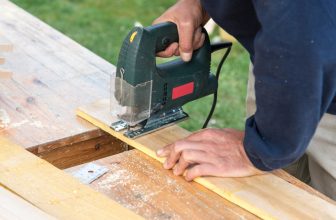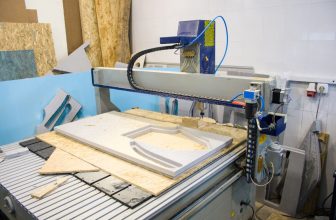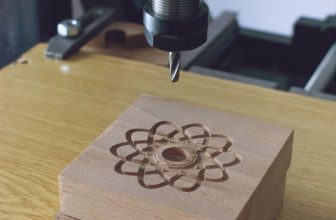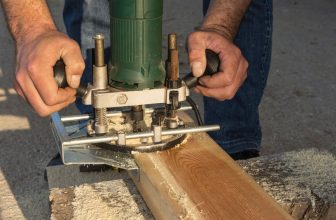There are more ways to invest now than ever before.
You can buy stocks, cryptocurrency, NFTs, precious metals, and much more. However, with many of these forms of investment, you are relying on someone else to offer you advice and make the trades for you.
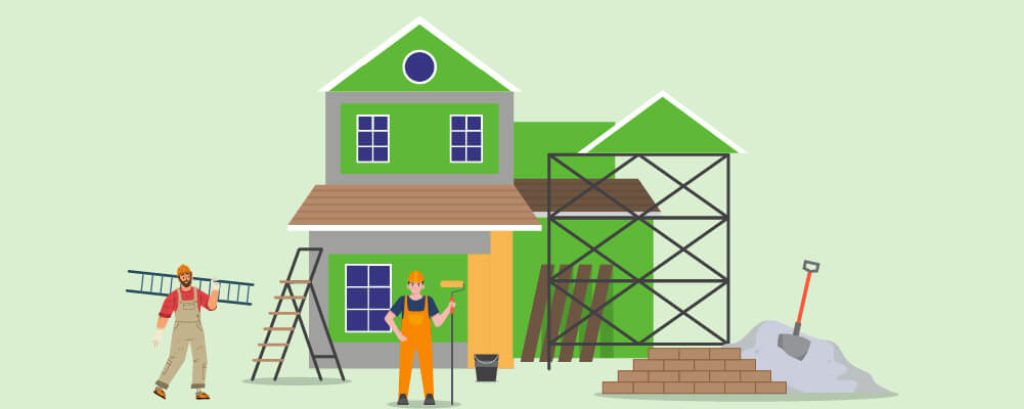
If you are someone who likes to take a more hands-on approach to what they do – then house flipping might be a form of investment suited to you.
When you flip a house, you get to make all the decisions – from which house you buy, how much work you put in, who you hire to tile the bathroom, and even what color carpet to put in the living room.
If house flipping sounds like your dream investment opportunity then you have come to the right place.
House flipping is a process that requires you to make a lot of decisions and develop a lot of skills. If you have the ability to learn and the time then it is something you can do on your own or you can bring others onboard to help you.
This article is a complete guide to the process that both beginners and experienced house flippers will find helpful. You will learn what house flipping is, how to finance it, and we will also share 13 tips with you that will make the whole process a lot easier for you.
Contents
Getting Started – What Is House Flipping?
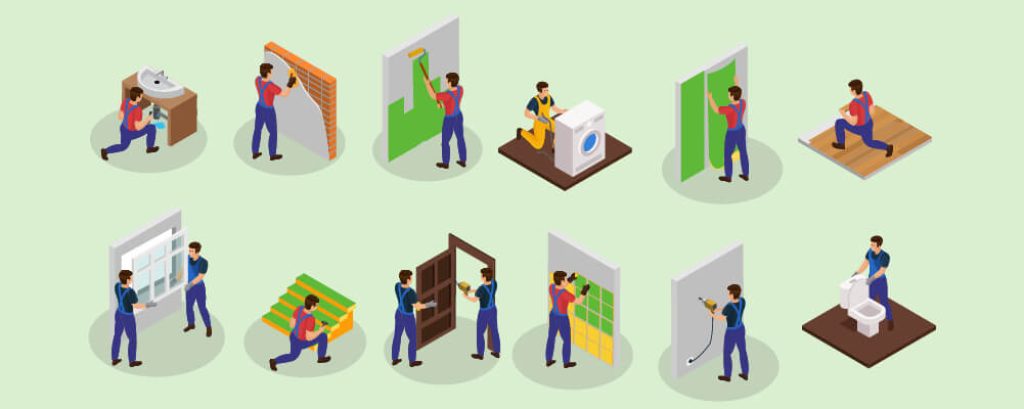
Typically, house flipping refers to the process of buying a house, doing it up, and then selling it for profit. However, some investors may skip the middle step if they buy at the right time and at the right price.
If you want to get started with house flipping then you will need to pick the area you want to buy in and find a home in fairly poor condition that you can do up. You would then do up the home, being careful not to spend too much money, and then sell the house on for a profit.
Investment Return Speed
One of the main reasons that people are drawn to house flipping is it is a relatively quick form of investment. With the average house flip taking 6 months, it is possible to make a vast amount of money in less than a year.
The value of stocks grows on average by 10% every year. The average house flip has a 54% return in value. You could be making a profit 10 times faster by flipping homes.
Where To Flip Homes
The average American makes a profit of $62,000 per house flipped. However, depending on where you live, you could be making a lot more or a lot less.
States with the best returns on investment (average return of over $100,000):
- Maryland
- Massachusetts
- New Jersey
- Washington
States with the worst returns on investment (average return of under $40,000):
- Texas
- Nevada
- Idaho
- Arizona
It is worth noting that most of the states with the lowest return on investment are the states where house prices are the lowest.
The Hands-On Approach
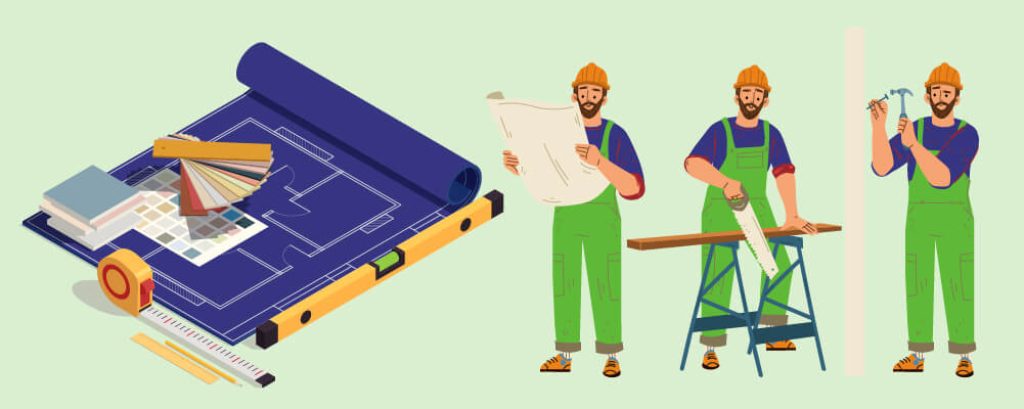
The easiest and most reliable way to make a profit while flipping houses is to do the majority of the work yourself.
The two things you will spend the most on during your renovation are labor costs and materials.
If you have the skills or can learn them, then you can cut out a lot of your costs. If you lay your own carpets, tile your own walls, and do the garden yourself then you can increase your profits at the end of the project.
To be able to do this, you will need to make sure that you have the time to spare to complete this work and that you have a plan to follow.
Some jobs, like installing the electrics and the central heating, you will want to leave to the professionals.
Recycled Materials
Another way to make sure you’re maximizing your profits is to try and reuse some of the materials that are already in the house.
You could reuse the old kitchen countertops to make built-in custom storage spaces in other parts of the room. Bricks that are in a good condition can also be reused. If you have old furniture lying about you could have it upholstered rather than replacing it.
You will also find that show rooms will give you a discount if you ask for the display items. If you are installing big appliances it is worth asking if they have any secondhand models you can purchase. These are usually around half the price and work just as well.
If you are working on a budget then don’t forget to visit local salvage yards, check craigslist, and even Facebook Marketplace for spare materials. Lots of people put perfectly good materials on sites like this to save themselves a trip to the dump or they want to see the materials have a new life with someone else.
Shopping smartly will save you a lot of money.
How It Works
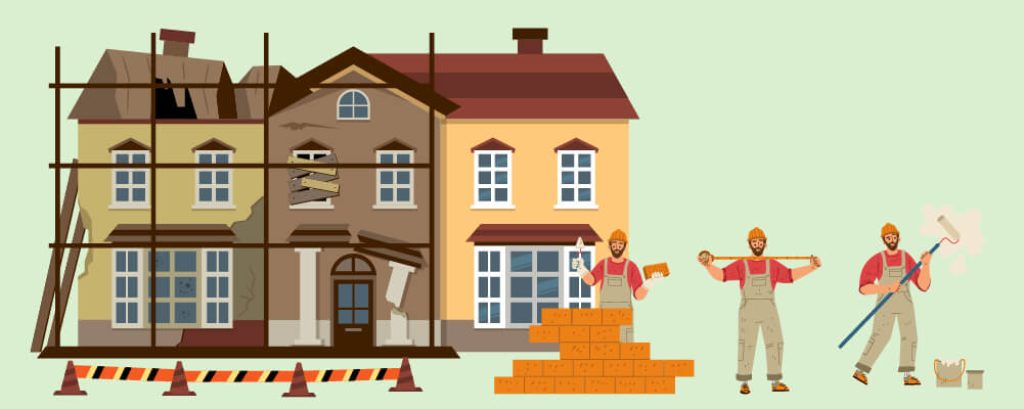
House flipping is a great way to invest but it is not something that you should jump into blindly. As the old saying goes, “failing to prepare is preparing to fail” and this is particularly apt for house flipping.
Before you start house flipping, you need to make sure that it is the right option for your finances, that you have a plan for the whole process, and that the market is in a good shape for buyers.
In this section, we will talk you through everything you need to know and do to prepare for your next house flipping project.
The Requirements
Good Credit Score
Unless you have enough money to fund the whole project upfront, then you will need to take out a mortgage to fund your house flip.
You can do this and still make a profit.
However, to be able to take out a second mortgage or multiple mortgages, you will need to have a good credit score and you will need to be in a good financial situation overall.
The best rule to remember when you are doing any kind of investment is that you should never invest money you can’t afford to lose.
If you are not in the financial position to start house flipping then you should work on improving your credit score before you start.
Enough Money To Fund The Whole Project
When you are applying for that mortgage and adding in your savings, you should make sure that you have enough money to carry out the whole project before you start.
If you have the money to buy the whole but not to do the renovation then don’t purchase a house. In the long run you will lose money by paying interest.
You don’t want to run out of money part way through the project and have to delay the whole process.
The longer the project takes, the less likely you are to make money.
The Process
Purchase A Property
Start this process by working out the price range that you are working in. You do not want to overspend on a house and not be able to renovate it quickly.
Pick a city. Then pick a neighborhood. Then start hunting for houses in that area.
Once you have found a house, visit it and have an inspector come round and look at it before you buy it. This will prevent you from buying a home that requires too much work or one that is overpriced.
Create A Project Plan

Once you have purchased your house, it’s time to put a renovation plan together.
Your inspector will be able to explain to you what you can do to the property to raise its value. Does the house need double glazing put in? Does it need new floors? Does it need a new kitchen and bathroom?
Most house flippers completely redo the home before putting it back on the market, but if this is your first project then you will be wary of taking on too much while you are still inexperienced.
As you are planning out your renovation, you can create a timeframe for getting the work done, items delivered, and put together a rough budget.
Try to add buffer days to either side of every job, you don’t know what might over run or be held up because the materials take longer to be delivered than expected.
Begin Renovating
This is where the fun begins.
If you are doing most of the work on the property yourself, then it is time to roll up your sleeves and get to work.
If you are hiring others to do the work, then you need to make sure everything is sticking to your time schedule – there are some jobs that need to be done before everything else and if they get delayed they will hold up the whole process.
Keep an eye out for materials that you can reuse or sell on to someone who might want to reuse them.
Complete Renovation
If everything goes to plan then all of the work will be done after 6-9 months.
Hopefully, you will have been able to keep to your budget and the house looks how you wanted it to.
Now it is time to get it ready for potential buyers to come and have a look around.
Sell The Upgraded Property
You will want to work with an estate agent to put the house on the market and make sure the right people are coming to visit it.
The estate agent will help you to work out the right asking price to put the house up for, based on how much you have spent on the property and the absolute minimum you will sell the house for.
The estate agent will take people on tours around the home and will find the right buyer. Then everything is handed over to the lawyers and soon the check will be in your bank account.
Common Mistakes To Avoid
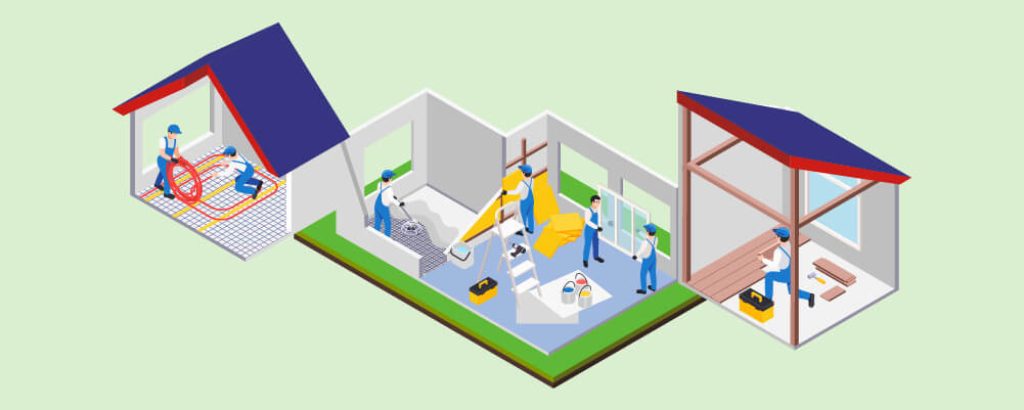
We mentioned at the start of this article that house flipping is not for everyone, but we notice that most beginners make one, two or all of the following mistakes even if they love the process.
Not Having Enough Money To Finance The Project
You need to make sure that you have enough money to finish the project before you start it. You also need to make sure that you have the money to pay the mortgage on the house while you are working on it.
When you are putting together a budget for the project, you will want to slightly overestimate all the costs. This means you are less likely to go over budget during the project or run out of money halfway through.
If you hire someone to do a job for you in the home, you want to make sure you have the money to pay them in advance.
You do not want to get in the mindset of thinking you will use future paychecks to cover the project – you never know when your financial situation might change.
Not Having Enough Time To Complete The Project
If you don’t have a lot of spare time or you travel a lot for your job you do not want to get into house flipping.
Even if you hire people to do every job in the house, it’s a very hands-on project that will take up a lot of time.
You not having the time to work on the house will delay the project and that delay will eat into your profits.
Not Enough Skills To Complete The Project Effectively
The more of the work you can do yourself, the bigger the profit you will be able to make.
However, if you take on a project like flipping a house, you will want to make sure that you have the right skills to do the job properly.
If you do the jobs yourself but do them poorly, you might actually reduce the value of your house rather than increase it.
If you are not handy and good at DIY, this is not a project that you will want to take on.
Not enough knowledge about the process as a whole
To be a good house flipper you need to be a jack of all trades – or you need to make yourself into one.
You need to be on top of property trends while you are buying the home. You need to have some knowledge of what interior design trends are in vogue right now. You need to know how to do all the building tasks that will come up. And you will need to know a lot about housing safety regulations.
Insurance companies that houses have to meet and you will not be able to sell a house that does not meet those requirements.
The worst thing you can do in house flipping is to jump into the project without preparing properly.
Not enough patience to get the job done
While the average house flipping project takes six months to complete, it is not always an easy six months.
There are a lot of plates to spin and choices to be made. You have to be prepared for a few things to go wrong and that not everything will happen as quickly as you want it to.
House flipping and renovation requires a lot of patience.
13 Tips And Tricks
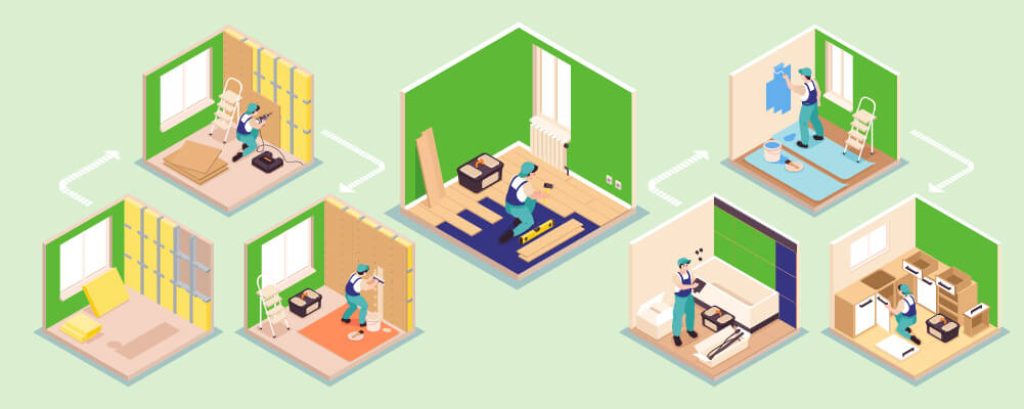
Before we leave you, we want to share 12 tips and tricks that will make your next house renovation easier.
These tips include small pieces of advice that can make a big difference – like make sure you research a neighborhood before you buy a house in it. And advice that seems obvious, but many people forget – like keep your final goal of making a profit in mind at all times.
Good luck with your renovations and house flipping.
1. Create A Budget And Stick To It
There are three things you need to consider when you create a budget for your project – (1) how much you will be able to borrow from your bank, (2) how much you can afford to borrow, and, (3) how much profit you want to make.
How much you can afford to borrow will inform the other two. Many people forget that they will need to pay the mortgage on the house while they are renovating it and it might be up to a year before they see any profit.
Remember, the better your credit score, the more your bank will be willing to lend you. If you have a poor credit score, it is worth trying to improve it before applying for a mortgage.
When you are working out how much you have and want to spend, you need to have a number in mind for how much you want to sell the house for. When you know this, your budget should be no more than 70% of that number.
If you can spend less and make an even bigger profit then even better.
When you are putting together your budget, allow for every stage to cost more than you expect it to. This way, you are unlikely to run out of money part way through or have your total spend eat into your lovely profits.
2. Create A Timeline For The Renovation
We know we have mentioned this a few times already in this article, and we will probably mention it again – but, the longer you spend on your renovation the smaller your profit will be.
If you can turn the project over quickly you will spend less on loan interest payments and you will have the profits in your bank account much quicker.
When you are working out everything you need to do to the house, you should also put together a time frame.
Research how long it takes to have a new bathroom installed, lay carpets, rewire a room – research all the jobs you or someone else will need to do in the home and what order they need to be done in.
Then make a plan of what jobs and going to get done and when. The best thing you can do while putting this plan together is overestimate how long it will take a job to get done and add buffer days to the schedule – especially when you have workers coming in back to back.
While you are planning, try to book in as many tradesmen as you can in advance. Many of the best people are booked up months in advance.
3. Know The Neighborhood
Try to look for houses that are up and coming. Neighborhoods that are about to have a lot of investment put into them or have a new attraction coming soon.
Properties in a neighborhood like this will quickly go up in value and offer an excellent opportunity to make a profit.
Look into what areas are near good schools, have low crime rates, and have had a good amount of recent sales – you can get all of this information online or from an estate agent.
4. Know The Market
Talk to a financial advisor before you start house flipping, they will be able to tell you whether this is a good time to buy a house in your state or area.
If the local housing bubble is about to burst then you may want to hold off until house prices drop. If they have just dropped then this is a good time to buy.
You should do the same when you want to sell the house, if the market is struggling, it might be worth holding off from selling for a few months so you don’t lose money.
5. Finance The Project
Make sure that you have all the money you need before you start the project – whether this is through your savings or by getting a mortgage.
Running out of money part way through the project is one of the worst things that can happen to a house flipper. When that happens the bills start piling up even if you are not doing any more work .
This will get in the way of you making a profit.
6. Decide On A Property You Would Like To Flip
Complete renovations offer the biggest opportunity for making profit as a house flipper. But if this is your first time going through the process then you might not have the capital, skill, or time to go through a big project like that.
For your first project, we recommend looking for a house that requires a medium amount of work.
It needs to be more work than the average person would want to do, but not so overwhelming that you bankrupt yourself taking on. Or so much work that you never finish it.
7. Do Not Pay Too Much For The Property
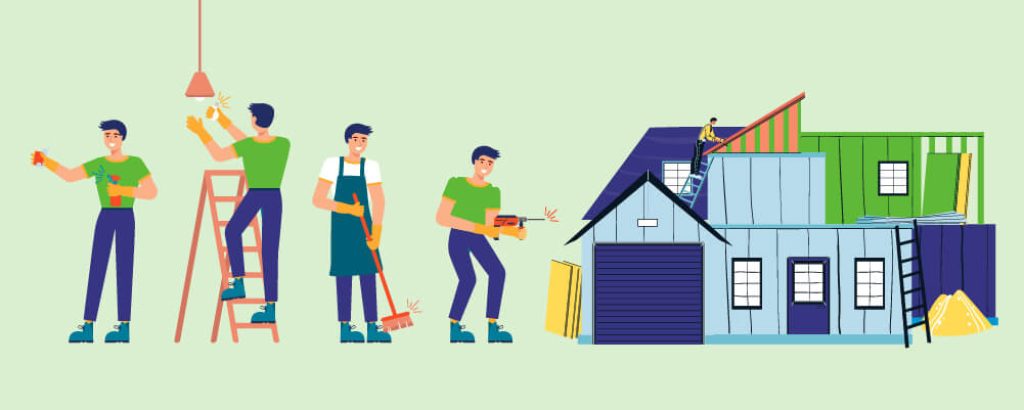
If you find a house that you really like, you need to be careful not to pay too much money for it.
If you buy the house for more than it’s worth, you are going to have a lot of trouble trying to sell it on for a profit – no matter how well you renovate it.
When house flipping, you should never offer more than the asking price and ideally, you should pay a lot less.
Try to look for houses that have been on the market for a long time, sellers are likely to take less than the asking price just so they can sell it and move on.
8. Get Guidance From A Local Real Estate Agent
When you are buying and selling the house, it is worth investing in the help of a local real estate agent.
No matter how much research you do, you won’t learn more about the market and the area than the people who do that stuff for a living.
They will be able to tell you how long a house has been on the market, if the seller is asking for too much, and they will be able to help you sell the house when the time comes.
If you flip multiple houses try to work with the same estate agent if they do a good job. You can build up a good relationship and you know your property will be in good hands.
9. Learn To Negotiate
When you are flipping houses you want to make sure that you are saving as much money as often as you can.
This can be done by negotiating when appropriate. Getting a good deal on the house should be your priority but along the way if you can get a good deal on your materials then you will only increase your profits.
There are many online courses that will help you to learn this skill.
10. Research Average Renovation Costings
The more knowledge you gather before starting the process the better.
Everyone in the business is trying to make a profit themselves, so knowing the average costs of the jobs you need done in your home will help not to get over charged.
For example, the average kitchen renovation costs between $7000 and $14,000. If someone is trying to charge you $20,000+ then you want to ask them to justify their costs.
The more you know about the process and the business the better.
11. Network With Potential Buyers
They say it’s all about who you know…
If you are in the business of house flipping then the more you want to be homeowners you can meet and network with the better.
A good way to build up demand for the homes you are working on is to create a social media profile for your house flipping project or business. Social media platforms will put you in contact with people you never would have met otherwise.
If you network successfully, you might even be able to sell the house before you finish renovating it. That is the holy grail for house flippers.
12. Know Your End Goal
As a house flipper you have one goal:
Increase the value of the home so that you can sell it for a profit
You need to make every choice with this in mind. Remember you are not doing up this home for yourself.
If you find tiles that you like, shop around and see if you can find a cheaper option. The buyer won’t care if you have bought $0.50 tiles rather than $5 tiles from Italy.
You will want to make sure that you spend money on the important parts – like the electrics, windows, and plumbing – and try to save on other categories.
13. What Is Your Skill Set?
Before you go into this project, you need to be aware of what jobs you can do and what is beyond your skills set.
This is something you need to think about in advance. You don’t want to attempt to rewire the house, get it wrong, and then have to bring in an expert to fix it.
So advanced planning and consideration will save you both time and money. The two most precious resources for house flippers.
You want to know before you make your budget what you will be doing yourself and what you will need an expert to come in and do.
Here is a list of skills that we recommend all house flippers develop before taking on their first project.
Summary
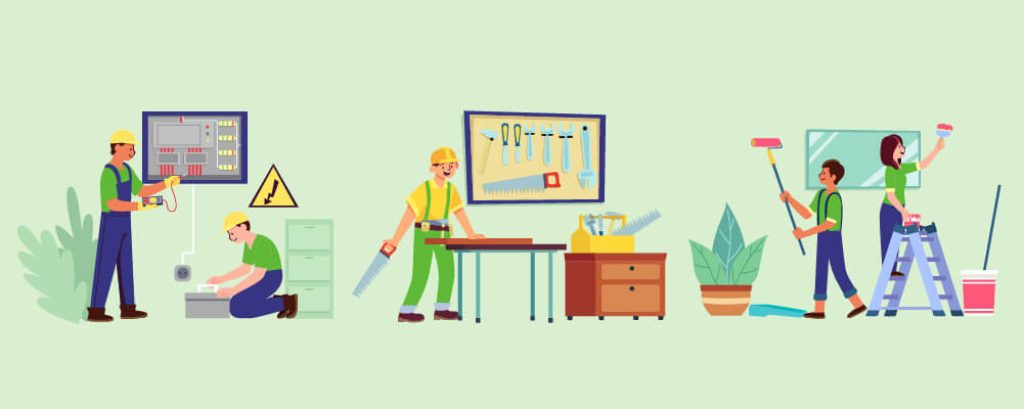
House flipping is the perfect form of investment for anyone who likes to be hands-on and in control of their money.
To be successful when house flipping you will need the time to do it and you will need a lot of patience. It is also important that you have as much of the money upfront as possible. If you make smart decisions, haggle well, and put in a little bit of elbow grease this can be an incredibly profitable form of investment with a quicker turnaround than most stocks and bonds.



